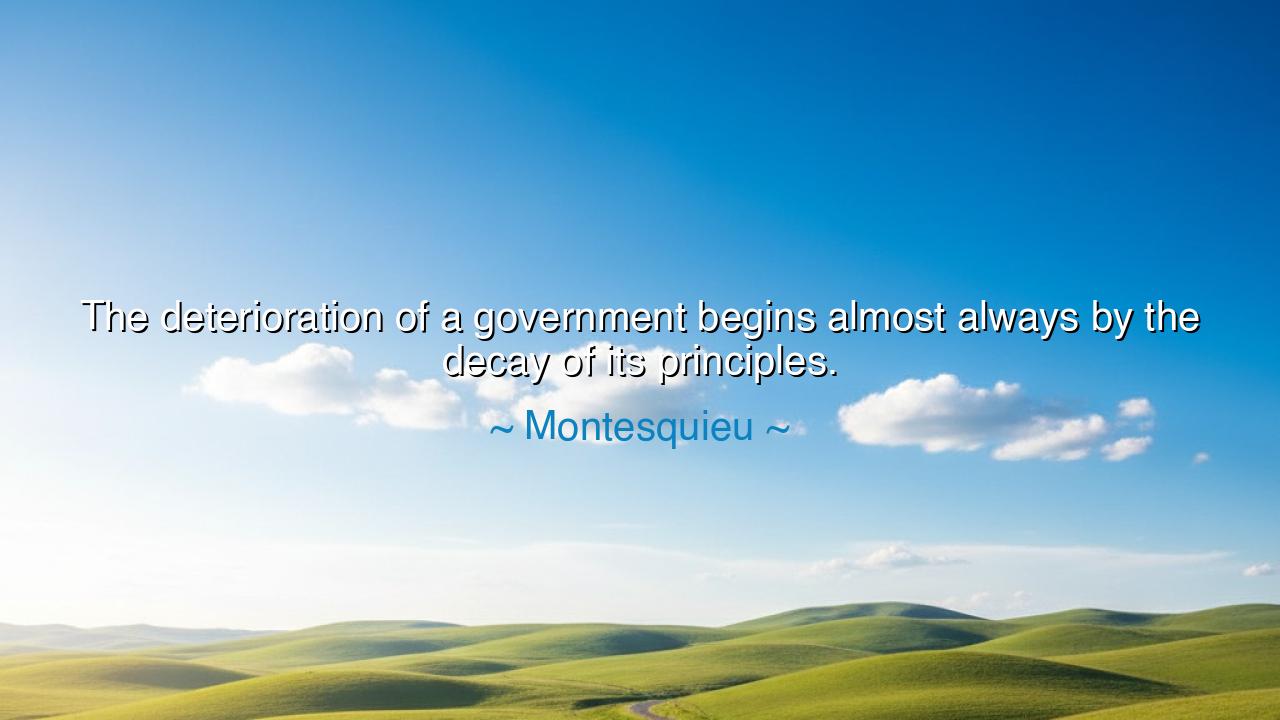
The deterioration of a government begins almost always by the






In the solemn halls of wisdom, where the voices of the great thinkers still echo through time, there stands the enduring warning of Montesquieu: “The deterioration of a government begins almost always by the decay of its principles.” These words, though spoken in the eighteenth century, bear the timeless gravity of prophecy. For they speak not only of governments, but of the soul of every nation, of every people, and of every man who has ever held power or trust. Principles are the lifeblood of civilization — unseen, yet they sustain all that endures. When they weaken, when truth is traded for convenience, and virtue for ambition, then rot begins beneath the marble pillars of even the grandest state.
Montesquieu, the philosopher of liberty, lived in an age when monarchs ruled by divine decree and nations trembled under the weight of absolute power. He watched as empires that once rose on ideals of justice and wisdom began to crumble under corruption and pride. His words were not the idle musings of a scholar—they were the distillation of centuries of human rise and ruin. He understood that no empire falls by force alone; its collapse begins within, where integrity erodes and principle turns to dust. The sword may end a kingdom, but hypocrisy is what unbuilds it.
To understand his truth, we need only look upon the story of the Roman Republic, that proud beacon of law and order. In its youth, Rome was governed not by tyrants but by ideals—duty, honor, and the sacred service of the people. The Senate debated for the common good; citizens took pride not in wealth, but in virtue. Yet over time, those ideals began to decay. Power became an inheritance, not a trust. The public offices, once symbols of service, became trophies for ambition. Bread and circuses replaced principle and discipline. And when at last the republic fell to Caesar’s might, it was not because of his strength, but because the heart of Rome had already grown weak. The decay of principles had paved the road to empire long before the first legion marched across the Rubicon.
So too does this warning resound in every age. A government does not collapse in an instant — it withers, quietly, as its leaders forget the purpose for which it was built. When justice becomes selective, when laws are bent to favor the powerful, when truth itself becomes a tool for manipulation, the pillars of governance begin to crack. Montesquieu reminds us that the strength of a nation lies not in its armies, its wealth, or its fame, but in the invisible architecture of its principles—its honesty, its fairness, its fidelity to the rule of law. These are the stones upon which liberty rests.
History, ever the patient teacher, has shown us this pattern again and again. The French Revolution, which came after Montesquieu’s time, was born of a monarchy that had long abandoned the principles of justice and equality. The kings of France, once believed to be ordained by heaven, drowned their people in taxes while feasting in palaces of gold. The gap between ruler and ruled widened, and the sacred trust between them was broken. When principles died, so did the government that had forsaken them. From its ashes rose a cry that still echoes through time: Liberté, Égalité, Fraternité.
And yet, Montesquieu’s wisdom is not merely a lament—it is a call to vigilance. He reminds us that every citizen, not only rulers, bears the duty of preserving a nation’s soul. Principles are not born in palaces; they are kept alive in the hearts of the people. When we tolerate corruption for convenience, when we excuse dishonesty because it benefits us, when we turn away from injustice because it does not touch us, we, too, take part in the slow decay. Governments are reflections of the governed; as the people’s virtue wanes, so too does their freedom.
The lesson of Montesquieu is both warning and hope. A decayed government can be rebuilt, but only if the people return to their principles. It begins with the smallest acts — speaking truth even when it costs us, treating others with fairness even when unseen, defending justice even when it trembles. Let no man believe that principles are the concern of philosophers alone; they are the breath of nations, the foundation of peace, the armor against tyranny.
So, my child of the future, let these words take root in your heart: guard your principles as a soldier guards his post. For once they falter, all else will fall. The banners of kingdoms will fade, the monuments of nations will crumble, but the spirit that lives by principle will outlast the ages. When others chase power, you must chase truth. When the world grows cynical, you must remain steadfast. For as long as one soul still believes that integrity is worth more than power, the flame of civilization will never go out.






AAdministratorAdministrator
Welcome, honored guests. Please leave a comment, we will respond soon